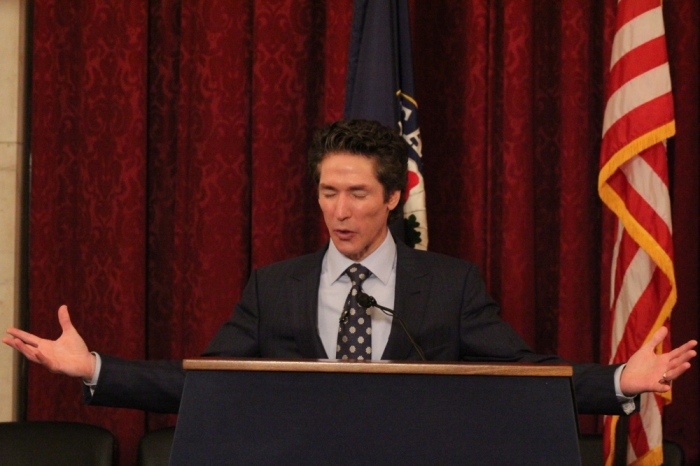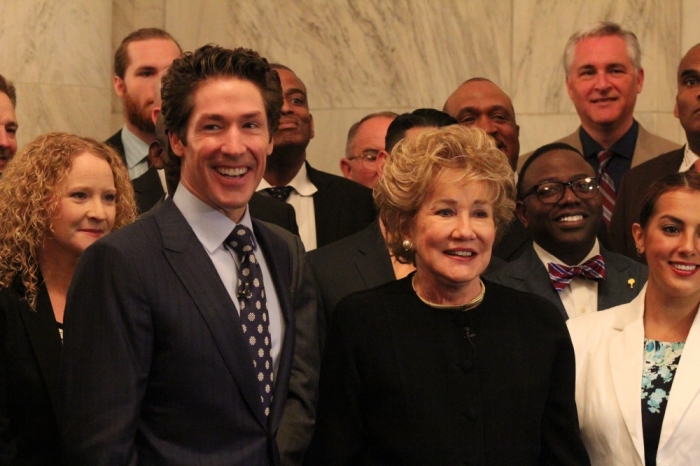Joel Osteen: Churches Need to Provide Spiritual Guidance That Military Caregivers Long For

WASHINGTON — With over 5.5 million Americans devoting their lives to caring for loved ones suffering from debilitating health conditions resulting from their military service, televangelist Joel Osteen says it is the church's role to ensure that military and veteran caregivers get the spiritual guidance they need to build their faith.
The Elizabeth Dole Foundation, a coalition founded by former Sen. Elizabeth Dole designed to raise awareness about the struggles facing military and veteran caregivers, commissioned a two-year study conducted by the RAND Corporation that found that spiritual guidance is one of the biggest needs facing family members, friends and others charged with caring for disabled veterans in order to help them maintain hope in their life.
Speaking with The Christian Post before a Hidden Heroes military caregivers awareness breakfast on Capitol Hill Thursday morning, Osteen, who is the pastor of Lakewood Church in Houston, Texas, explained that many spouses, mothers, fathers and others who have halted their lives to care for their loved ones cannot easily take breaks from their time-consuming responsibilities to attend a church or seek a pastor's guidance.
Although there are many different ministries and support groups designed to help the veterans through their pain and struggles, the caregivers are often "overlooked" even though they face their own struggles and depression with having to work over 40 hours a week or more to care for their friends or family members.
"Sometimes [caregivers] are so overwhelmed by taking care of their loved one that it is just so hard to get out," Osteen explained. "What we have learned from Senator Dole is that we need to become aware of that because [churches] have been good at taking care of veterans and the people that are wounded but sometimes these people that are there taking care of their loved ones, they get overlooked."
Dole told CP that according to the RAND study, caregivers tend to look for advice from religious leaders. However, many church leaders across the nation are unaware the systemic struggles that military caregivers face that cause them to question their faith.
"RAND told us that when caregivers are really frustrated and depressed and it is becoming a very hard and heavy load, they turn first to the clergy," Dole said. "But the clergy don't always know about this population. It's important to get the word out, to embrace the families and find solutions – short term and long term – to help these caregivers with what they need to take care of their loved ones."
Also speaking at Thursday's breakfast was Texas pastor Sonia Alvarado, the mother of injured Army Sgt. Luis Alvarado. Sonia explained that she began questioning her faith after her and her husband began taking care of their son in 2011 when he was wounded in Afghanistan. Although Alvarado has been preaching the Gospel for over 15 years, even she was not immune from falling away from faith.
"I was angry at God. How can this happen? How can the God to whom I have preached for so many years allow this to happen," Alvarado asked. "During the difficult days, weeks and months that followed, we sometimes struggled with our faith and many of our fears took hold of us. But finally, we realized that there was a better way."
"For caregivers, it is very important to have faith," Alvarado continued. "The alternative is fear but fear only brings pain. Faith on the other hand brings hope, brings strength and brings the assurance that God is with us. That assurance is the power that keeps us going."

Osteen said church leaders and other faith leaders need to continue to make other churches aware that there is a dire issue facing military and veteran caregivers, so that they can step in and help caregivers in their communities. Osteen said the issue is not with churches being unwilling to help, but just that many churches are still unaware that this is a major crisis facing Americans.
"The biggest thing for us was to become aware of it because I wasn't necessarily aware until I got involved with Senator Dole," Osteen admitted. "She has brought it to our awareness and when you hear the need, nobody turns away. We put it out to the several thousand churches that we work with and just its the same response that I had, 'Absolutely, we will help.' I think we can all be doing more, not to put anybody down, but it's just when you have the tools and you know the problem is there, we can address it in a better way."
Osteen said churches should form groups designed to not only pray with caregivers in their community but that also help them out with the "simple things" – like buying groceries or mowing the lawn – that will allow the caregivers to enjoy free time for themselves.
"I think they should be aware of the need and then form some kind of outreach groups, just something where you are really targeting the caregivers," Osteen said. "I think one of the biggest things, although it is small in a sense, but just giving them a day off and say 'You know what, we are going to come and take care of your loved one.' I think simple things like that, having prayer groups, having people that can keep them encouraged, friendships to keep them from being lonely."
Although Osteen would like to see more churches get involved in helping out caregivers, Dole reminded CP that supporting caregivers is a responsibility that falls on all sectors of American society.
"This is a societal crisis that must be answered with a national response. It's not something that just the government can do. It has got to be public, private sector, the non-profit organizations, the faith community and the labor community," Dole said. "Moving forward in a holistic manner with this national coalition, we have got hundreds of organizations involved. When they learn and find out about it they say, 'What can I do to help.' So raising awareness is just critically important here."





























